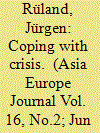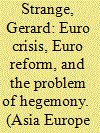|
|
|
Sort Order |
|
|
|
Items / Page
|
|
|
|
|
|
|
| Srl | Item |
| 1 |
ID:
159353


|
|
|
|
|
| Summary/Abstract |
Why has East Asia had such a poor record of regional leadership? This is an important question given the fact that East Asia is synonymous with remarkable economic growth and development. At one level, the absence of indigenous leadership might not seem to matter. And yet, when America’s “long-distance” leadership is in apparent decline and China is actively seeking to assert itself, the question of leadership has assumed renewed importance. This paper considered the nature and importance of leadership and explores its impact in case studies of the Asian financial crisis of the late 1990s and the so-called “global financial crisis” of the late 2000s. At this stage, it is unlikely that China will be able to replace America’s leadership role.
|
|
|
|
|
|
|
|
|
|
|
|
|
|
|
|
| 2 |
ID:
159354


|
|
|
|
|
| Summary/Abstract |
The key argument of this article is that during serious crises and external shocks, societal actors do not necessarily follow the predictions of theories on ideational change. This literature argues that crises and external shocks spur ideational change as expectations associated with the old order are no longer met. A study of the Association of Southeast Asian Nations (ASEAN) shows that the Asian financial crisis of 1997/1998 stimulated a reform debate but that this discourse did not facilitate paradigmatic changes in the region’s repository of cooperation norms. What at first sight appeared to be an accelerating Europeanization of Southeast Asian regionalism proved to be a process involving the retention of major elements of the region’s “cognitive prior.” New ideas of regional integration have at best been emulated or localized, but have not led to a thorough transformation of Southeast Asian cooperation norms. This must be attributed to the entrenched nature of the region’s cognitive prior epitomized by the worldviews of political decision-makers who regard the external world as essentially hostile. This belief has been reproduced many times in the political experiences of the region’s foreign policy elites—not least by the Asian Financial Crisis—thus confirming the ideational orthodoxy that national sovereignty provides the best protection for nation states. A deepening of regional integration is faced with major ideational obstacles under these conditions.
|
|
|
|
|
|
|
|
|
|
|
|
|
|
|
|
| 3 |
ID:
159355


|
|
|
|
|
| Summary/Abstract |
This article uses the concept of ‘obligated policy transfer’ (OPT) to analyse the impact of crisis on climate and energy policy in the European Union. First, it reviews the strengths and limitations of some variants of institutionalism in providing insight into how crises might impact on policy. It explains the underdeveloped concept of OPT and how it is highly appropriate for analysing the EU institutional system and EU policies. OPT is a type of policy transfer that is both voluntary and coercive: Member States voluntarily commit to a policy that is subsequently enforced back on them by a supranational institution during the implementation phase. Importantly, the ideational environment affects how an institutional system develops policy. Crises have impacted on the ideational environmental of the EU by damaging the legitimacy of EU integration. This has exposed structural weaknesses in the system, created institutional change and affected the development of climate and energy policy. Specifically, the analysis reveals that crises have the greatest impact on the agenda-setting and legislative phases of policy transfer in the EU because these are the most ‘voluntary’ phases for Member States. Ultimately, the article provides a way of thinking about the institutional structure of the EU that can help explain institutional change and policy outcomes.
|
|
|
|
|
|
|
|
|
|
|
|
|
|
|
|
| 4 |
ID:
159352


|
|
|
|
|
| Summary/Abstract |
The article applies the contested concept of hegemony to the euro and the eurozone crisis of 2009–12 to critically scrutinise the parameters and limits of the euro reform process. Conceptualising the euro as a ‘public good’ designed to help stabilise and legitimise the EU’s regional market order is a useful ideational starting point for critical inquiry, one that is in line with hegemonic stability theory. However, drawing on neo-Gramscian theory, the article contends that, in practice, the euro has been self-limited through its ‘external’ and ‘internal’ embedding in a neoliberal form of ‘minimal hegemony’. While the reform process has achieved some notable stabilising changes to the support structures and governance of the euro, nevertheless, reform has largely failed to tackle fundamental problems at the heart of the euro’s tendency towards crisis: the single currency’s subordination to a global financial regime dominated by neoliberalism, Germany’s neo-mercantilist dominance of the eurozone economy and fundamental differences of macroeconomic conceptualisation and preferences between the eurozone’s core states, France and Germany. The article critically scrutinises developments in eurozone monetary policy in the wake of the crisis to demonstratively argue that the euro remains locked in to a form of minimal hegemony that constrains the development of the euro as a ‘deep and genuine’ public good.
|
|
|
|
|
|
|
|
|
|
|
|
|
|
|
|
| 5 |
ID:
159357


|
|
|
|
|
| Summary/Abstract |
The Euro, refugees, Brexit, thriving right-wing populism and time and again a lack of coherence and consistency in EU foreign policy, as in Iraq 2003 or in Libya in 2011—seem to point to the EU in crisis. The idea of normative power Europe (NPE) essentially entails that the EU has a transformative impact on international society also outside its own borders. In light of such developments, the question arises whether such a transformative impact still seems possible. Rather than dealing with all such different moments of crisis, this article focuses on an alleged EU foreign policy crisis and asks whether—as NPE sceptics argue—inconsistencies and a lack of coherence in EU foreign policy undermines the idea of a transformative agenda and thus puts NPE to crisis. This article introduces the concept of ambiguity as a particular way of studying NPE. Ambiguity in this sense is an inevitable feature of the social world—of the EU as a global actor and of processes of change. Thus, the argument is put forward that ambiguity does not necessarily impinge on the EU’s transformative agenda. Rather than being an indication of a foreign policy crisis, the ambiguous nature of the EU and resulting ambiguous policies actually do underpin the EU’s transformational potential.
|
|
|
|
|
|
|
|
|
|
|
|
|
|
|
|
| 6 |
ID:
159356


|
|
|
|
|
| Summary/Abstract |
For regional organizations (ROs) as geographically defined entities, questions of membership often raise moral questions about the very foundations of regional identity. To date, comparative approaches to the role of norms in the politics of RO enlargement are a missing piece in the regionalism literature. This paper assumes that enlargement practices are shaped by discourses about legitimate actorness. Drawing on the concept of “standards of civilization,” I argue that prospective RO members are judged against a set of norms—the standard of membership—which constitute basic ideas about the identity of the regional international society. As evidence from the Spanish and Greek accession to the European Community and the accession of Myanmar and Cambodia to ASEAN shows, this standard is not a static catalogue of cultural values, as existing accounts suggest, but develops in response to accession requests which trigger normative crises among the existing member states. In such situations, RO actors may argue for the inclusion of new norms in the standard of membership by drawing on “cognitive priors”. Enlargement processes thus reveal a dialectical relation between regional norms and boundary-drawing; while a regional standard of membership informs the redefinition of an RO’s boundaries, the accession of new candidates also transforms that very standard.
|
|
|
|
|
|
|
|
|
|
|
|
|
|
|
|
| 7 |
ID:
159351


|
|
|
|
|
| Summary/Abstract |
We live in an age of seemingly never-ending crisis. Financial markets are gripped by one convulsion after another, welfare systems are buckling under the strain of potentially unrealisable expectations, violent transnational non-state groups challenge state authorities and populist politicians and authoritarian leaders employing an old-fashioned nationalist rhetoric are on the rise across the world. The old order is clearly crumbling, but it is far from certain what sort of new one is waiting to be born. It is even less certain what role—if any—regional organisations and identities will play in it.
|
|
|
|
|
|
|
|
|
|
|
|
|
|
|
|
|
|
|
|
|